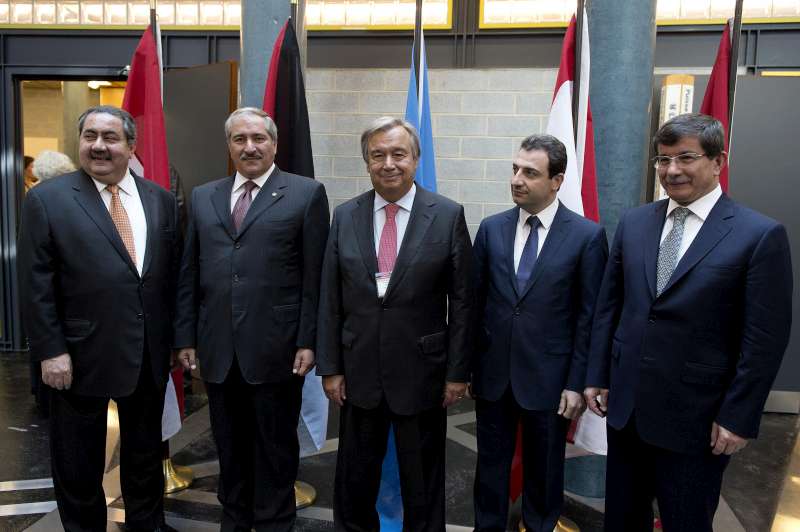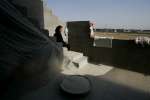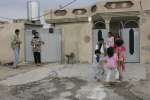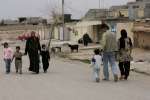- Text size
 |
|  |
|  |
| 
- عربي
UNHCR and host countries to push for greater international help on Syrian refugees
News Stories, 4 September 2013
GENEVA, September 4 (UNHCR) – The UN refugee agency and the governments of Iraq, Jordan, Lebanon and Turkey said in Geneva on Wednesday they will work together to seek an urgent and major expansion of international help for the region as it struggles to cope with the Syrian refugee crisis.
The agreement came during a half-day meeting chaired by UN High Commissioner for Refugees António Guterres and including Lebanon's Minister of Social Affairs Wael Abu Faour, Iraqi Foreign Minister Hoshyar Zebari, Jordan's Foreign Minister Nasser Judeh and Turkey's Foreign Minister Ahmet Davutoğlu. These four countries are hosting most of the refugees who have fled Syria since March 2011.
The meeting followed the announcement by UNHCR on Tuesday that the number of Syrians registered as refugees or awaiting registration as refugees had passed the 2 million mark, or about 10 per cent of the population. A further 4.25 million are displaced within Syria, according to UN figures. More than 97 per cent of Syria's refugees are hosted by countries in the immediate surrounding region.
Guterres and the four ministers issued a statement in which they expressed "serious concern" about the deteriorating humanitarian situation in the region, and the devastating impact this is having on the countries hosting large Syrian refugee populations. They also urged stepped up efforts to end the war. "A political solution to end this cycle of horror is urgently needed," Guterres told reporters.
In the joint statement, the High Commissioner and the ministers said the region was "facing the dramatic escalation of the Syrian conflict, namely with the use of chemical weapons. We strongly appeal to the international community to overcome existing differences and come together to stop the fighting."
Guterres and the ministers said Thursday's meeting had been very fruitful and would be followed by regular meetings and between the four host countries.
"We agreed that all four countries would work with UNHCR to deal with the [refugee] crisis on the ground," said Turkey's Davutoğlu, adding that there needed to be be a new global awareness about the Syrian refugee crisis. "Today, we decided to have a joint working team and an action plan on how to create this global awareness."
Guterres had earlier noted that Syria's neighbours had given shelter to millions of refugees and were buckling under the strain of this influx and needed more robust support and stronger burden-sharing by the international community, including through bilateral and multilateral aid.
"Our central message is these countries need and deserve massive support from the international community, and that support is not yet there and it is essential to have a shift in the way the international community is handling that support," he told the journalists at a joint press conference.
UNHCR and its partners in June appealed to donors for US$4.4 billion for Syria relief operations this year, including US$3 billion to meet humanitarian and host community needs in the immediate surrounding region. About 40 per cent of this component has been funded.
"At 30 months and counting, we have to move beyond short-term humanitarian responses for Syrian refugees and start to address the immediate to long-term, structural, economic and development impact this crisis is having on the countries hosting them as well. What is happening in Syria will have profound implications for neighbouring states for years to come," Guterres said earlier, adding that failure to act would be an "international failure of historic proportions."
Many people fear the situation will get even worse after a year in which the conflict escalated dramatically and about 1.8 million people were forced into exile.
Wednesday's agreement paves the way for a ministerial-level meeting to be held at the end of the month in Geneva as part of UNHCR's annual Executive Committee gathering. Those discussions will seek to build consensus for large-scale commitments incorporating humanitarian and emergency development support. This would include the involvement of international financial institutions.
Of the 2 million refugees, Lebanon hosts the most with some 720,000, followed by Jordan with 520,000, Turkey with 464,000 and 200,000 in Iraq. Egypt is hosting an additional 111,000 Syrian refugees. The real figures are believed to be higher.
In Lebanon, the refugees are scattered across 1,400 localities. Heath, education, and water and sanitation systems are all over-stretched. In certain areas, security has become more tenuous – complicating governance and aid delivery. In Jordan, the Syrian refugee influx has swollen the population size by 10 per cent, with the overwhelming majority in Jordanian cities and villages. This increase has constituted an enormous pressure on Jordanian resources, services and infrastructure.
In troubled Iraq, the 160,000-strong Syrian refugee population has been swollen further by the recent sudden influx of more than 40,000 people from north and north-east Syria. In Turkey, the government has responded to the refugee influx with US$2 billion in support. Refugees are spread across 21 camps where they receive shelter, health care, security and other services. Almost a quarter-of-a-million Syrians are already documented as living outside of camps in urban locations.








































